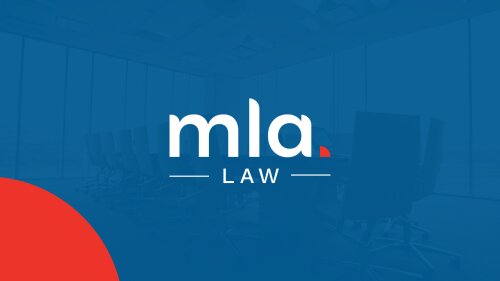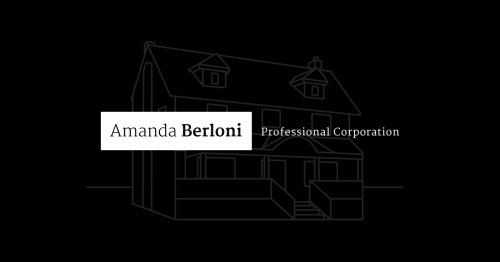Best Mortgage Lawyers in Greater Sudbury
Share your needs with us, get contacted by law firms.
Free. Takes 2 min.
Free Guide to Hiring a Real Estate Lawyer
List of the best lawyers in Greater Sudbury, Canada
About Mortgage Law in Greater Sudbury, Canada
Mortgage law in Greater Sudbury, as in the rest of Ontario, governs the legal arrangements between borrowers and lenders when real estate is used as security for a loan. Whether you are purchasing your first home, refinancing, or considering a second mortgage, navigating the legalities of mortgages ensures your rights and obligations are clear. Local real estate transactions are impacted by both provincial legislation, like the Ontario Mortgages Act, and federal regulations that dictate terms, foreclosure processes, and consumer protections.
Why You May Need a Lawyer
Securing a mortgage is one of the most significant legal and financial decisions you can make. A lawyer’s assistance can be essential for several reasons:
- Purchasing residential or commercial property and needing independent legal advice.
- Reviewing and explaining mortgage terms or lender agreements before signing.
- Identifying or addressing problematic or predatory lending practices.
- Resolving disputes about repayment, default, or foreclosure.
- Transferring an existing mortgage or refinancing with new terms.
- Discharging a mortgage once it’s paid off, to ensure title is free and clear.
- Navigating mortgage enforcement or power of sale processes if payments cannot be made.
In these situations, legal advice helps prevent costly mistakes and secures your interests.
Local Laws Overview
In Greater Sudbury, mortgages are regulated primarily by provincial laws and governed by standard practices within Ontario. Key legal elements include:
- The Mortgages Act (Ontario): Outlines lender and borrower rights, including notice periods and sale procedures in case of default.
- Ontario Land Titles and Registry: Mortgages must be registered against property title, affecting your ability to sell or refinance.
- Power of Sale: If a mortgage goes into default, Ontario allows lenders to sell the property after proper notice, bypassing lengthy court foreclosure proceedings.
- Interest Rate and Disclosure Laws: The law requires disclosure of effective interest rates and fees, and limits on what lenders may charge.
- Priority of Mortgages: Rules on which mortgages are paid first when there is more than one registered against a property.
- Consumer Protection: Legislation protecting borrowers from misleading terms and requiring plain-language disclosure.
Municipal by-laws generally do not impact mortgage law directly, but factors such as property taxes, zoning, and utility arrears are considered by lenders during the approval process.
Frequently Asked Questions
What is a mortgage and how does it work in Sudbury?
A mortgage is a loan secured against real property, where the property acts as collateral for the lender. In Sudbury, as in all of Ontario, the mortgage agreement must be registered, and outlines payment, interest rates, and the lender's rights if you default.
Do I need a lawyer when buying a home with a mortgage?
Yes, in Ontario, a real estate lawyer is needed to complete land registration, review and explain the mortgage documents, and ensure the property is free from prior claims or liens.
Can a lender foreclose on my property if I miss payments?
Yes, but in Ontario, the process is usually through "power of sale," which allows the lender to sell the property after proper notice periods if the mortgage goes into serious arrears.
How can I find out if a property has an existing mortgage?
A title search through the Ontario Land Registry Office can show any registered mortgages or liens on a property.
What costs are involved beyond the mortgage itself?
Buyers should budget for legal fees, land transfer tax, title insurance, appraisal fees, and any adjustment costs (e.g., property taxes or utility bills paid in advance by the seller).
Can I transfer my existing mortgage to another property?
Some mortgages are "portable," allowing you to transfer them to a new property. This depends on your lender’s policies and terms, so legal review is essential before making any commitments.
What happens when I pay off my mortgage?
When your mortgage is paid in full, your lawyer can arrange for a discharge of mortgage document to be registered, clearing the mortgage from your property title.
Is refinancing my mortgage a legal process?
Yes, refinancing involves legal steps especially if you are switching lenders. New terms are negotiated, and title documents updated. A lawyer reviews and registers all changes.
How are disputes between mortgage holders resolved?
Disputes can be negotiated by lawyers, or if necessary, resolved through Ontario civil courts or mediation, particularly in complex situations involving default, fraudulent activity, or title concerns.
Are there risks with private or alternative mortgages?
Private mortgages can involve higher interest rates and more aggressive enforcement policies. Legal review is strongly recommended to understand all terms and ensure your rights are protected.
Additional Resources
For more information or to seek help, you can contact:
- Ontario Ministry of Government and Consumer Services: Provides guidance on property transactions, mortgages, and consumer protection laws.
- Ontario Land Registry Office (Sudbury): For land title and mortgage searches.
- Sudbury Real Estate Board: A resource for local market conditions, realtor information, and real estate guidelines.
- Licensed Mortgage Brokerages: These offer regulated mortgage advice and can connect you to licensed lenders.
- Law Society of Ontario: For referrals to qualified real estate lawyers in Greater Sudbury.
- Canada Mortgage and Housing Corporation (CMHC): Offers consumer guides and mortgage calculators.
Next Steps
If you require legal advice regarding a mortgage in Greater Sudbury:
- Gather all relevant documents, such as property agreements, mortgage pre-approvals, or lender correspondence.
- Research and select an experienced Ontario real estate lawyer with knowledge of Sudbury’s market.
- Schedule a consultation to review your circumstances, including any concerns about legal terms or negotiations.
- Follow your lawyer’s advice regarding document review, mortgage registration, or dispute resolution.
- Keep copies of all documents, and do not sign agreements you do not fully understand.
- Stay up to date with legislative or market changes that may impact your mortgage.
Professional legal advice is invaluable for protecting your financial interests and ensuring a successful outcome in any mortgage transaction.
Lawzana helps you find the best lawyers and law firms in Greater Sudbury through a curated and pre-screened list of qualified legal professionals. Our platform offers rankings and detailed profiles of attorneys and law firms, allowing you to compare based on practice areas, including Mortgage, experience, and client feedback.
Each profile includes a description of the firm's areas of practice, client reviews, team members and partners, year of establishment, spoken languages, office locations, contact information, social media presence, and any published articles or resources. Most firms on our platform speak English and are experienced in both local and international legal matters.
Get a quote from top-rated law firms in Greater Sudbury, Canada — quickly, securely, and without unnecessary hassle.
Disclaimer:
The information provided on this page is for general informational purposes only and does not constitute legal advice. While we strive to ensure the accuracy and relevance of the content, legal information may change over time, and interpretations of the law can vary. You should always consult with a qualified legal professional for advice specific to your situation.
We disclaim all liability for actions taken or not taken based on the content of this page. If you believe any information is incorrect or outdated, please contact us, and we will review and update it where appropriate.











